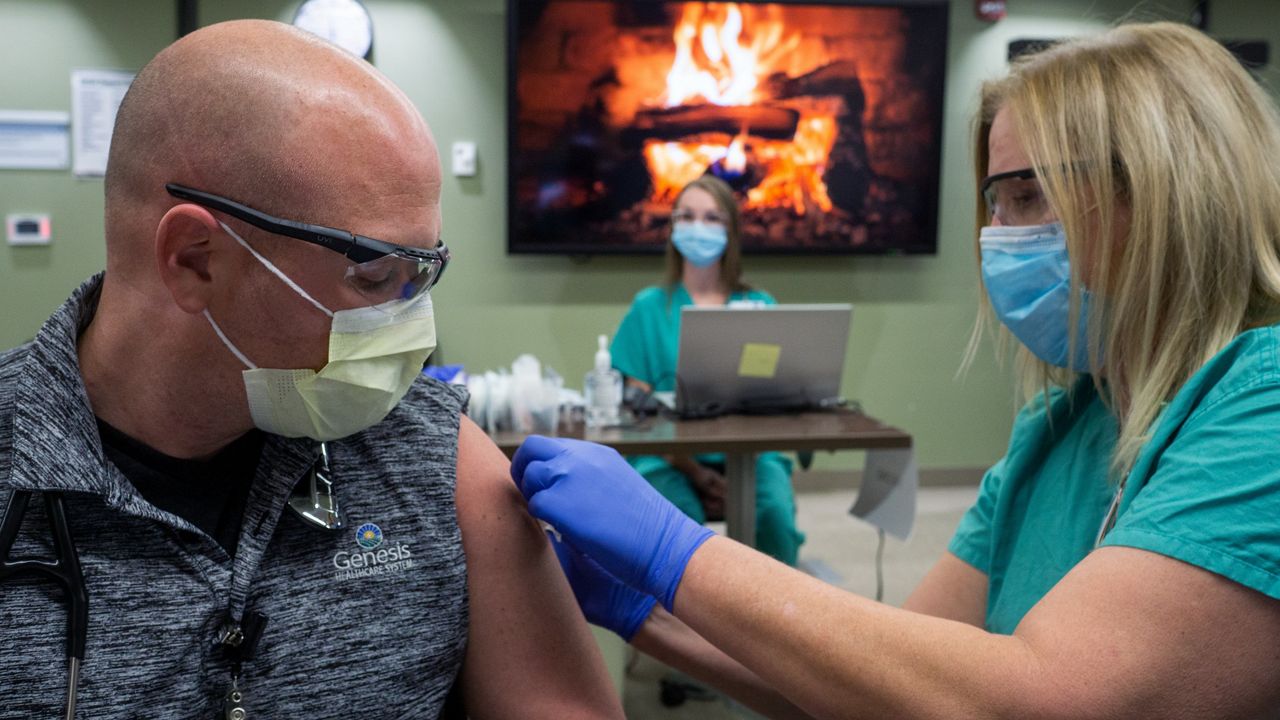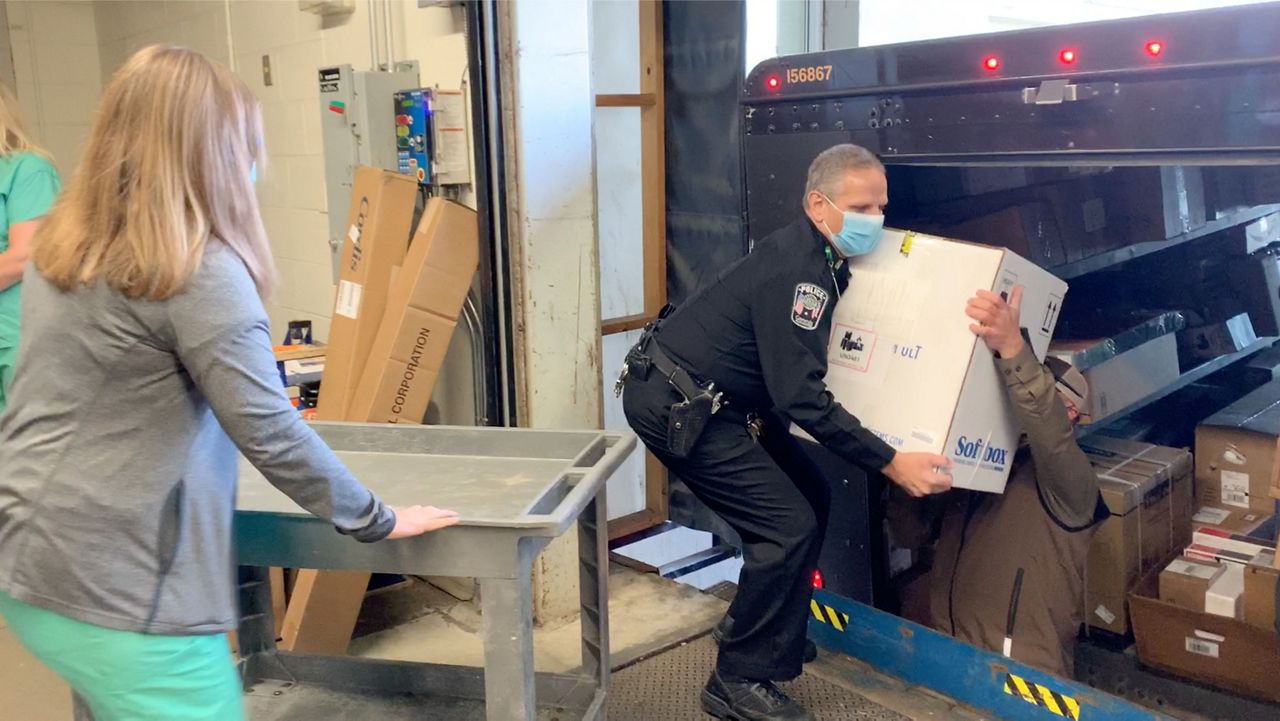COLUMBUS, Ohio — After 42 years of nursing, Zanesville nurse Terri Campbell says she has administered what feels like a million shots, but the one she gave Tuesday was special.
That morning, an 81-pound package carrying a shipment of the Pfizer-BioNTech vaccine arrived in a UPS truck at the Genesis Health Care System hospital where Campbell works.

The location is one of 10 hospital sites in the state where the first round of Pfizer’s vaccine has landed. The first shots to hospital staff brought scenes of brief celebration. But nurses with tired faces said the challenges they face are not over. As the first health care workers received shots this week, their colleagues were down the halls of their hospitals caring for the state’s 5,143 hospitalized patients in Ohio Hospitals’ coronavirus wards.
More vaccine shipments will soon be on the way to Ohio as the state scales up its distribution of the vaccine. Expectations are Ohio receives 420,000 doses by Christmas and more than 650,000 by Jan. 1. Those numbers inlude doses of Moderna’s vaccine, which would ship out weekly for immunizations beginning next week.
Nationwide Children's Hospital's Dr. Pablo Sanchez, a member of a key federal vaccine committee, said he expects to participate in emergency meetings this weekend if Moderna’s vaccine is approved by the Food and Drug Administration Friday.
“A sense of hope”
Hospital officials reminded the state this week that their staffs have been working maximum hours the last several weeks as cases have soared in Ohio and locally.
Ohio State Wexner emergency department nurse Nate Royster said he hopes the immunizations will help the hospital avoid infections and quarantine situations that sideline staff at the same time patient numbers are heightened.
“It really is a sense of hope, a sigh of relief knowing that the more employees that we get vaccinated the less that we’re going to have take off for exposures, or take off for actually being positive because that really does impact your staffing on a day-to-day basis when you have employees that are off for two weeks at a time,” he said.
Getting the vaccine did not bring side effects for Royster other than some pain near the injection site.
Royster says those who are skeptical should research the advantages of getting the shot versus the potential for a side effect. Officials say residents may want to talk to a medical professional to discuss considerations related to getting the vaccine.
“It’s just like you’re going to a restaurant and you've never been there before. You look at the reviews, you want to know the comments and the ratings. We don't really have that yet for the vaccine. We're just still waiting on more research to come out,” Royster said. “But we know that COVID-19 isn't good, so we know we don't want to go to a bad restaurant. We've seen what that's done to us.”

After receiving his shot, Ryan Smith, a nurse in Genesis Hospital's critical care unit daily said receiving the vaccine will help relieve hospital workers fears of taking the virus home. Smith treats multiple COVID-19 patients every day, he said.
“We all have loved ones at home that we are concerned about, especially our vulnerable populations, our mothers, our fathers, our grandparents, and then we're also always worried about our kids,” he said.
Eyes on Moderna
Neonatal infectious disease specialist at Nationwide Children’s Hospital Dr. Pablo Sanchez.
Sanchez, a member of the Centers for Diseases Control and Prevention’s Advisory Committee on Immunization Practices, which votes on vaccine allocation and the tiering of priority groups, participated in emergency meetings last weekend for Pfizer and will likely do so again this weekend if Moderna is approved Friday.
“We've been voting on allocation, tier groups as to who should get it first, second, and it's an ongoing process because a lot will depend on how much vaccine supply there is,” Sanchez said.
The vaccine arrived at Genesis Hospital around 9:30 a.m. and infectious disease Dr. Jignesh Modi will get the first shot in a few minutes here, with these nice fireplaces in the background. @SpectrumNews1OH https://t.co/GtXzLDHMuB pic.twitter.com/FHBrbJ74ch
— Pete Grieve (@pete_grieve) December 15, 2020
He explained that Moderna’s vaccine will help the country advance through the first phase, healthcare settings and and long-term care facilities, and enter phase "B", which includes essential workers -- about 60 million people -- in fields like food and agriculture, transportation, education, law, enforcement, waste management, and water utilities. Sanchez said the committee will be in discussions as officials define that category of essential workers.
Logistics in Action
The vaccine shipment comes with a temperature tracker and a GPS tracker, Genesis pharmacy director Laura Kelso explained. The process to unpack the shipment, thaw the vaccine, mix it up, and draw syringes takes about two hours, she said. Then there is a six-hour window during which the diluted vials must be used.
Facilities like Genesis are uniquely prepared to administer the Pfizer vaccine. The hospital already had an ultra-cold freezer from an old research project.
That allowed Kelso’s team to pull out amount needed for the day, setting the remainder of the shipment in the freezer for the next round of shots. Hospital officials said they would do the shots over the course of about three days.
Reflecting on the first immunizations, Genesis officials said their resources were an advantage and that other facilities like health departments or health centers will have to approach administering the vaccine differently without the same storage equipment. The state of Ohio has drilled its plans for dry ice distribution and repackaging, which will roll out in the coming weeks.
The 10 hospitals that received vaccine shipments Monday and Tuesday are using those doses to immunize their own staff members that fall in the top priority group. At Genesis, that is about 1,600 people.
Receiving the vaccine is optional and some staff may also opt to wait for a shot if the timing doesn't work now. Hospitals are scheduling follow-up appointments three weeks later for the second dose in the sequence.
Officials are looking for a commitment to being available on the follow-up date, but emergencies are inevitable. The second shot can be administered no earlier than 17 days after the first, but providers will work to reschedule a shot for someone who misses it. The vaccine is believed to be effective even if the second shot is given a few days or weeks late.
Dr. Christina Liscynesky, Wexner’s associate director of epidemiology, said during a Wednesday briefing the side effect that concerns her most is fever.
In the Pfizer vaccine trial, 15% of people reported fever, though some patients in placebo groups reported fever too, she said. Any symptom that might prompt a COVID-19 quarantine is a fear at a time when hospitals are stretched thin with staffing, Liscynesky said.



